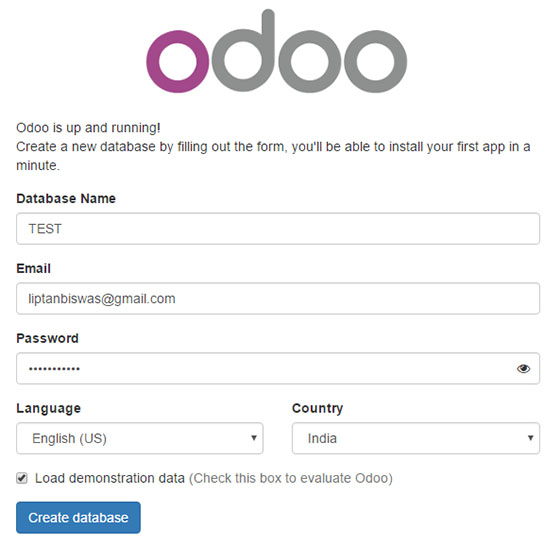
In this tutorial, we will show you how to install Odoo on AlmaLinux 8. For those of you who didn’t know, Odoo is a group of open-source business apps that offers a wide range of applications including, CRM, accounting, billing, inventory, warehouse, e-commerce, project management, and more. It is a web-based and fully-featured application that helps you to maintain the ERP in any business. Odoo comes with 30 core modules and more than 4500 community-created modules that help you to customize it from a small shop to an enterprise-level corporation.
This article assumes you have at least basic knowledge of Linux, know how to use the shell, and most importantly, you host your site on your own VPS. The installation is quite simple and assumes you are running in the root account, if not you may need to add ‘sudo‘ to the commands to get root privileges. I will show you the step-by-step installation of the Odoo customer relationship management software on an AlmaLinux 8.
Prerequisites
- A server running one of the following operating systems: AlmaLinux 8.
- It’s recommended that you use a fresh OS install to prevent any potential issues.
- A
non-root sudo useror access to theroot user. We recommend acting as anon-root sudo user, however, as you can harm your system if you’re not careful when acting as the root.
Install Odoo on AlmaLinux 8
Step 1. First, let’s start by ensuring your system is up-to-date.
sudo dnf update sudo dnf install epel-release
Step 2. Installing Required Dependencies.
Now we required dependencies on your server. You can install all of them with the following command:
sudo dnf install python3 python3-devel git gcc git redhat-rpm-config libxslt-devel bzip2-devel openldap-devel libjpeg-devel freetype-devel
Step 3. Installing PostgreSQL database.
Run the following command to install the PostgreSQL package to your system:
sudo dnf install @postgresql:12
Next, initialized to PostgreSQL database with the following command:
/usr/bin/postgresql-setup initdb
After that, start the PostgreSQL service and enable them to start at system reboot:
sudo systemctl start postgresql sudo systemctl enable postgresql
Then, create a new PostgreSQL user for Odoo with the following command below:
su - postgres -c "createuser -s odoo"
For additional resources on installing PostgreSQL, read the post below:
Step 4. Installing Odoo on AlmaLinux 8.
Now we create a dedicated user for Odoo:
useradd -m -U -r -d /opt/odoo -s /bin/bash odoo
Then, log in with the Odoo user and download the latest Odoo packages with the following command:
su - odoo git clone https://www.github.com/odoo/odoo --depth 1 --branch 14.0 /opt/odoo/odoo14 cd /opt/odoo
Once done, change the directory to /opt/odoo and create a new Python virtual environment:
python3 -m venv odoo14-venv source odoo14-venv/bin/activate
Then, install the required Python modules:
pip3 install -r odoo14/requirements.txt
After that, deactivate from the virtual environment and exit from the Odoo user with the following command below:
deactivate exit
Next, create addons and log directory with the following command:
mkdir /opt/odoo/odoo14-custom-addons mkdir /var/log/odoo14 && touch /var/log/odoo14/odoo.log
We will create a new directory for the custom modules and change its ownership to the ‘odoo’ user:
chown odoo: /opt/odoo/odoo14-custom-addons chown -R odoo: /var/log/odoo14/
Step 5. Creating Odoo Configuration.
Now we create an Odoo configuration file which is located on the /etc/odoo.conf. The content of the configuration file is as follow :
nano /etc/odoo.conf
Add the following line:
[options] admin_passwd = odoo_master_password db_host = False db_port = False db_user = odoo db_password = False xmlrpc_port = 8069 logfile = /var/log/odoo14/odoo.log logrotate = True addons_path = /opt/odoo/odoo14/addons,/opt/odoo/odoo14-custom-addons
Save and close the file when you are finished.
Step 6. Create a Systemd Service file for Odoo.
Now create an Odoo systemd unit file by creating a new file /etc/systemd/system/odoo.service:
nano /etc/systemd/system/odoo.service
Add the following lines:
[Unit] Description=Odoo14 #Requires=postgresql-10.6.service #After=network.target postgresql-10.6.service [Service] Type=simple SyslogIdentifier=odoo14 PermissionsStartOnly=true User=odoo Group=odoo ExecStart=/opt/odoo/odoo14-venv/bin/python3 /opt/odoo/odoo14/odoo-bin -c /etc/odoo.conf StandardOutput=journal+console [Install] WantedBy=multi-user.target
Save and close the file. Then, reload the systemd daemon with the following command:
sudo systemctl daemon-reload sudo systemctl start odoo sudo systemctl enable odoo
Step 7. Configure Firewall for Odoo.
For Odoo to be accessible on a browser, open the port across the firewall.
firewall-cmd --zone=public --permanent --add-service=http firewall-cmd --zone=public --permanent --add-port=8069/tcp firewall-cmd --reload
Step 8. Accessing Odoo Web Interface
Once successfully installed, now open your web browser and access the Odoo web UI using the URL http://your-server-ip-address:8069. You should see the following page:

Congratulations! You have successfully installed Odoo. Thanks for using this tutorial for installing the Odoo business management software on your AlmaLinux 8 system. For additional help or useful information, we recommend you check the official Odoo website.